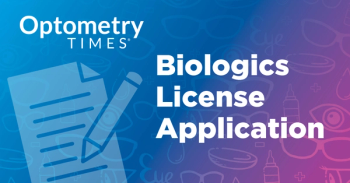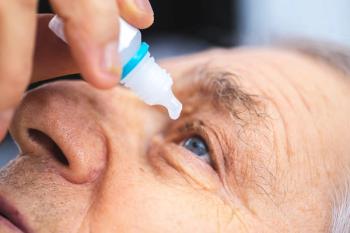
World Health Assembly panel to shine light on global pervasiveness of uncorrected refractive error
Representatives from CooperVision and the International Agency for the Prevention of Blindness give a preview of what to expect at the "Universal Access to Glasses: Promoting Multisectoral Action" event at this year's World Health Assembly in Geneva, Switzerland.
To further advocate for eye health and combat uncorrected refractive error across the globe, the International Agency for the Prevention of Blindness (IAPB) and the World Health Organization (WHO) have organized the event, "Universal Access to Glasses: Promoting Multisectoral Action," to take place at the 77th annual World Health Assembly (WHA). On May 30 in Geneva, Switzerland, the event will be hosted by the governments of Nepal and Malaysia. Jessica Thompson, IAPB representative, and Stuart Cockrill, representing Industry on behalf of CooperVision, gave a preview of the event and underscored the importance of uncorrected refractive error awareness in an interview with Optometry Times.
Those interested in registering for the event's livestream, going live from 7:30-9:30 a.m. CET, can do so on the IAPB's
Video Transcript
Editor’s note - The following transcript has been lightly edited for clarity.
Emily Kaiser Maharjan:
Hi, everyone. I'm here today to talk about the World Health Assembly, which is gathering in Geneva on May 30, and is aptly named the "Universal Access to Glasses: Promoting Multisectoral Action." The panel is organized by the World Health Organization (WHO) and the International Agency for the Prevention of Blindness or IPBA. And today, I'm here with Jessica Thompson as a representative of the IAPB, as well as Stuart Cockrill, who's representing Industry on behalf of CooperVision. So welcome to both of you. I'm really glad that you could take the time to chat with me about this, I'm really excited to dig deep into it.
Jessica Thompson:
Thank you for having us, Emily. We're really, really pleased to be here speaking on this very important event.
Stuart Cockrill:
Yeah, thanks for having us and as Jess said, it's a really important event. And obviously, anything we can do to elevate and get more people engaged is critical to us.
Kaiser Maharjan:
Of course, so first, can you tell me a little bit more about the panel that is happening at the World Health Assembly?
Thompson:
Yes, well we are really delighted to be coordinating this event at the 77th World Health Assembly, which is hosted by the governments of Malaysia and Nepal, who've demonstrated tremendous leadership on this issue. So we're really grateful for their continued support. And we'll also have the support from the World Health Organization, as you said, and the International Labour Organization. And really, this is an opportunity for us, and all of those who will be present at the event to raise awareness of this issue as ministries of health and health officials from across the world gather in Geneva. And it's really an opportunity for us to try and emphasize the need for political leadership, promoting obviously a cross sector response, emphasizing the impact of this issue, and then also discussing some solutions and policy recommendations.
Cockrill:
Thanks, Jess. I think just to add from my perspective, I'm honored to be sitting on the panel representing industry. I think with all of this is about bringing private and public sector organizations together as well as governments. And in the end, if we want to get this issue dealt with around the world, dealing with the 800 million plus people who have uncorrected refractive error, it needs to bring together private sector as well in all these countries, as well as support of NGOs and others.
Kaiser Maharjan:
Absolutely. And this is building upon the 2021 UN resolution Vision for Everyone. Can you tell me a little bit more about this resolution just for a little bit of context? And then, also maybe tell us a little bit about what IAPB and Industry has been doing in the intervening years to push the initiative forward?
Thompson:
Yeah, well I think an awful lot has been achieved over the last couple of years. Actually, I remember when I first joined, IAPB, which was 5 years ago now, I remember speaking to somebody at the WHO, and they had just received all 194 health strategies from governments across the world. And eye health featured in only 3, which just goes to show, you know, how little political attention eye health really had even 5 years ago. Since then, as you said, we've had this landmark UN resolution on vision, which recognized for the first time the impact that vision, eye health, refractive error, has on the broader Sustainable Development Goals. So not just health, but economic productivity, growth, education, gender, reducing inequalities, and that really called for a multi sector response to the issue and then has driven a lot of the work that we've done at IAPB with all of our partners across the world. So we have 200 members who are really trying to advocate for this now at national level, and also continue to drive it at the global level, which is partly why we're holding this event at the World Health Assembly. And I think what's really exciting, you know, particularly around this topic of uncorrected refractive errors that this event comes just off the back of the launch of a new initiative from the WHO, the SPECS 2030 initiative, which I think will create a great opportunity for us to engage new stakeholders and governments around this topic.
Cockrill:
I think just start to add to what Jess has said, if you look at it, the last few years have been exceptionally busy in trying to build awareness. Obviously, there's been vision screening done at the UN multiple times. There's also the UN vision care exhibition that was done. Photo exhibitions, again, is increasing their profile there. Engagement from the World Health Organization has been unbelievable. The support they're providing and really trying to engage multiple countries and multiple industries and sectors and bringing everyone together is also incredible to really try and increase [advocacy to combat] this issue.
There's also been a lot of, on the economic side, looking at what is the impact of uncorrected refractive error, both in education and in businesses. And examples have been done where businesses have done screening. An example is in Bangladesh where they did screening of workers and they found a significant increase in output and productivity by doing this. In Sri Lanka, they did it on tea workers, and they actually saved a whole day's worth of productivity by by allowing people to see clearly. So it's an easy, simple solution that can really deliver easy results for everyone, improve education, improve productivity, and help to ultimately grow the global economy as well, because that's what everyone wants to see happening through this.
Kaiser Maharjan:
I also am just kind of curious about what are some of the aims and goals of this event?
Thompson:
As I mentioned, I think 1 of the critical aims is really to encourage political leadership and commitment. What we're seeing with refractive error is that is so often left out of the health system, but also broader government planning; as Stewart says, the impacts across productivity, economic growth, but also around education, and the need for ministries of education to integrate this within their mandate is really important. I mean, giving child a child and access to a pair of glasses reduces the odds of failing a class by over 40%. And actually, children in low-mid income countries who don't have access to glasses are 2 to 5 times more likely not to be in school. So we really need the whole of the government and all of the kind of sectors within governments to work together around this topic. So I think that's the first and foremost sort of critical ambition of this event is to try and encourage that political leadership, but also to bring other stakeholders together to discuss how public private partnerships can really sort of achieve change, and particularly on a new scale, think about how we can really solve the financing gap that exists around this topic. I mean, actually, this is one of the most effective health interventions and cost effective health interventions that you can make. So it's about discussing those policy solutions.
Cockrill:
Yeah, I think just to add, I think it really helps us to elevate the overall issue of uncorrected refractive error and to highlight it's not just the problem in 1 country. It's a problem, every country; everyone is seeing the impacts of this. We know in the last 30 years we've seen a significant increase in myopia around the world, which is then leaving even more children with uncorrected refractive error. And picking it up early is critical; the sooner we pick it up, the sooner we can both correct it and then treat it. So we know the world is changing. Education is a big factor in driving that, the higher demands of education around the world. So helping everyone to realize that wherever you are in the world, if you're an optometrist, or anyone, or an ophthalmologist, if you're anywhere in the world, you can do your little bit in your community to think, "How can I go and help to find people with uncorrected refractive error, both in schools and in businesses?" In the end, it's all to benefit everyone's lives.
Kaiser Maharjan:
Yeah, absolutely. And, Stuart, this is a question just for you. But could you tell me a little bit more about how industry partners are supporting this initiative?
Cockrill:
Yeah, I think is we've got multiple industry partners now coming into support. Obviously, we did a lot. From our perspective, it's providing the advocacy, providing some of the networks, and I think also, as the SPECS initiative starts to expand, there are industry partners who are very good at sourcing product that then can be sourced for some of these countries. They know how to go about sourcing. I think also industry partners will help to establish in some of these markets, it's going to come critical to establishing an optical channel, a sustainable network. You can't just have a go in and do the screening and get out. Really driven behind it, is the support.
One thing CooperVision is done for many years is supporting Optometry Giving Sight. And they're all about trying to establish optometry schools in countries around the world that don't have them. So that's again as another part of the fundamental, where industry is really trying to help establish, from the ground, the right people to be able to do this to make it a sustainable sector in every country. And ultimately, when you get to sustainable sector that helps you grow economies in these markets as well. So helps the development of them as being able to see clearly is 1 of the fundamentals of being able to do your best in both education and work.
Kaiser Maharjan:
So one of the goals of the organization is to unite members of the eye care community and you know, we've been talking a lot about policy change and sustainable growth and making sure that we're putting in various guardrails to kind of help make sure that this keeps being pushed forward. But for any optometrists, eye care providers, industry members who are maybe watching this and feeling inspired and feeling like they want to contribute to this initiative, what can they go out and do to help support you?
Thompson:
Well, we believe that everyone can be an advocate for this issue and I believe very passionately in the power of collective advocacy. We've seen actually, just in the last couple of years what we can achieve when we joined together. The UN resolution is a perfect example of that. So, I mean, we would encourage everyone to sort of join the IAPB network, be part of our global advocacy effort, but also the advocacy effort that exists [at the] regional, national, and local level. Then we connect members all across the world to do their bit within their own community.
I think if you're an individual a perfect opportunity for you to get involved as around the World Sight Day. That is our critical moment, to really elevate and raise awareness of this issue, not just with government, but also, more importantly, with the general public. And our campaign around World Sight Day is all about loving your eyes and getting your eyes tested. And this year, we're shining a spotlight on children, and have worked very closely with Stuart and others on building that campaign. And I think, you know, it's a really great way for people to join together and become local advocates for. That's what we would encourage.
Cockrill:
Yeah, I think just to add to Jess, World Sight Day has been incredible the last few years, as a common point, wherever we come together. Every year it's got more and more commitments on screenings, and we go from children to adults back to children again this year. And I think for every optometrist, it's [to] look at your local schools and think, "What can I do to help screen them? How can I help?" rather than rely on the children's to come to you. Spend a day, go into schools, do some screening, find those that need the uncorrected refractive error, find out how you can then help them to see clearly and realize their potential and sign up and commit the numbers to World Sight Day and we will easily beat the target. I believe it's 10 million this year, but I'm sure we can get that to 50 to 100 million if we can get everyone behind us supporting this around the world.
Kaiser Maharjan:
Is there a way for interested parties to watch the panel discussion on May 30?
Thompson:
Yes, there is we would very much welcome people to join us. It will be live streamed. So we'll provide the link and also for people to engage and ask questions of the panel. So yeah, please do sign up, come along. If you can't come along, because it doesn't quite work for your times then we'll have a recording, which we would encourage everyone to watch as well.
Kaiser Maharjan:
Is there anything else that either of you want to touch on that we haven't mentioned?
Cockrill:
It's a great event, it's going to help elevate it further and we will continue to push and elevate this issue, as in the end, there are devices that can make it simple to deal with the issue. So let's make sure that we're catching people and giving them the opportunities as soon in life as they can.
Kaiser Maharjan:
Fantastic. Well, thank you both, again, so much for taking the time to chat with me today. This is such a powerful message and I'm really excited to tune into the live stream on May 30.
Newsletter
Want more insights like this? Subscribe to Optometry Times and get clinical pearls and practice tips delivered straight to your inbox.








































